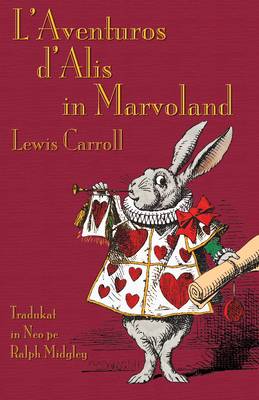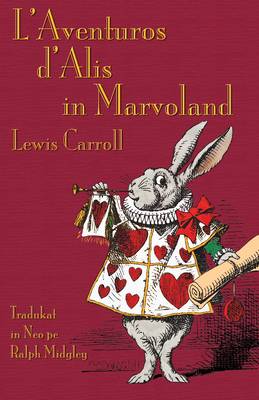
Bedankt voor het vertrouwen het afgelopen jaar! Om jou te bedanken bieden we GRATIS verzending (in België) aan op alles gedurende de hele maand januari.
- Afhalen na 1 uur in een winkel met voorraad
- Gratis thuislevering in België
- Ruim aanbod met 7 miljoen producten
Bedankt voor het vertrouwen het afgelopen jaar! Om jou te bedanken bieden we GRATIS verzending (in België) aan op alles gedurende de hele maand januari.
- Afhalen na 1 uur in een winkel met voorraad
- Gratis thuislevering in België
- Ruim aanbod met 7 miljoen producten
Zoeken
Omschrijving
Lewis Carroll sar plumnam. Charles Lutwidge Dodgson sir lo vera nam del autor, ki sir profesor de matematio she Christ Church, Oxford. Dodgson ensir et istorel lo 4. Jul nel anyo 1862 van il fir un jit in ropabatel ol flum Thames in Oxford, kompanat pel Rev. Robinson Duckworth, kon Alice Liddell (isanya), fel del Dekan de Christ Church, e la du soros, notye: Lorina (istreanya) ed Edith (otanya). Sar evidenta dal poem al enso del libro, ke lo tre yuninos askir Dodgson rakonti a zel un istorel. Toprime, epete ezitanda, il ensir en rakonti a zel lo prima versyon. Totye nel texto del libro, ki sir ende publikat nel anyo 1865, il riferar a zel mulyes nel libro, mo lesmode semiskelat. Arturo Alfandari sir nasat in Italyo lo 8. Jun 1888, e laborir as exporter, pre sirvir as belga diplomat. Nel anyo 1937, van parir ke un guer sir neevibla, Alfandari decidir ke il vir fi somo po elpi kambi lo perspektivos del komunio inter-nasyona tange lo viv generale, plu pekule meze komunikilo, ke tos pur uti. Alfandari, ki bone spir sep linguos, examir Esperanto, mo krir ke it sar tro komplikat; konseke il ensir inventi sa propa linguo ki sir plu simpla e plu regla, kon radik-vortos plu kurta. Nel anyo 1961, il publikir un manual ligalat d'et linguo internasyona titlat "Neo", ke Paul Rasquin deskribir as "lo natura devolvo noevibla de Esperanto". Aldo Lavagnini it an deskribir as "un mezo radika e satisfa del riformo de Esperanto, ki pur si axeptat pel Esperantistos as simplazo de za linguo". -- Lewis Carroll is a pen-name: Charles Lutwidge Dodgson was the author's real name and he was lecturer in Mathematics in Christ Church, Oxford. Dodgson began the story on 4 July 1862, when he took a journey in a rowing boat on the river Thames in Oxford together with the Reverend Robinson Duckworth, with Alice Liddell (ten years of age) the daughter of the Dean of Christ Church, and with her two sisters, Lorina (thirteen years of age), and Edith (eight years of age). As is clear from the poem at the beginning of the book, the three girls asked Dodgson for a story and reluctantly at first he began to tell the first version of the story to them. There are many half-hidden references made to the five of them throughout the text of the book itself, which was published finally in 1865. Arturo Alfandari was born in Italy on 8 June 1888, and worked as an exporter before serving as a Belgian diplomat. In 1937 when it looked as though war was inevitable, Alfandari decided that he wanted to do something to help to change people's outlook on life, and to do so by making available a means of communication which everyone could use. A polyglot, Alfandari examined Esperanto, but believed that it was too com-plicated, and he set about devising a language which was simpler and more regular, with shorter root words. In 1961 he published a bound manual of his international language Neo, which was described by Paul Rasquin as "the natural and inevitable further development of Esperanto" and by Aldo Lavagnini as "a radical and satisfy-ing way for a reform of Esperanto, which could have been accepted by Esperantists even as a simplification of their language."
Specificaties
Betrokkenen
- Auteur(s):
- Illustrator(s):
- Uitgeverij:
Inhoud
- Aantal bladzijden:
- 134
- Taal:
- Engels
Eigenschappen
- Productcode (EAN):
- 9781782010197
- Verschijningsdatum:
- 21/03/2013
- Uitvoering:
- Paperback
- Formaat:
- Trade paperback (VS)
- Afmetingen:
- 140 mm x 216 mm
- Gewicht:
- 176 g

Alleen bij Standaard Boekhandel
+ 43 punten op je klantenkaart van Standaard Boekhandel
Beoordelingen
We publiceren alleen reviews die voldoen aan de voorwaarden voor reviews. Bekijk onze voorwaarden voor reviews.












